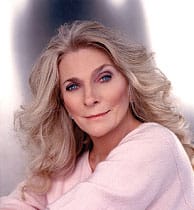Life Extension Magazine®
More than 40 years have passed since singer/songwriter Judy Collins rose to fame in the coffeehouses of Greenwich Village alongside folk activists Bob Dylan, Joan Baez, and Pete Seeger. Since then, the two-time Grammy Award winner best known for her rendition of Joni Mitchell’s “Both Sides Now” has recorded more than 40 albums, written nine books including a novel, and received an Academy Award nomination for co-directing “Antonia: A Portrait of a Woman.” Age has definitely not affected her energy or enthusiasm, and Collins, who turned 71 on May 1 last year, shows no signs of slowing down. This June, she wrapped up a six-week run at New York’s Café Carlyle, released a new CD called “Paradise” from her own recording company, Wildflower Records, and published her first-ever children’s book titled Over the Rainbow. She still performs frequently, is working on a new book, and plans to do more song writing. Private StrugglesCollins, who released her first album in 1961 at age 22, credits her lengthy career, wondrously intact soprano voice, and energy to rigorous self-discipline. “My lifestyle is more and more like an athlete’s,” she said in an interview with Life Extension recently. “I take lots of vitamins, exercise, meditate, pray, and read on a regular basis. It’s what I have to do in order to sing, perform (she does about 100 shows a year), do my traveling, my writing, and the other work I do when I’m not on the road.” She uses glucosamine sulfate with MSM for her arthritis, which she says is under control, and ginkgo for her memory. Although her lovely voice radiates a sweet serenity, her private life has been full of trauma and heartbreak—a suicide attempt at 14, years of drug abuse and alcoholism (she’s been sober for 30 years), tuberculosis, hepatitis, divorce from her college sweetheart, bulimia, and bouts of depression and panic attacks.
The toughest hurdle came in 1992 with the suicide of her 33-year old son and only child, Clark Taylor, who had been struggling with some of Collins’s same problems including substance abuse and depression. “I was beyond devastation,” she told me, as we sat in her sprawling, four-bedroom New York apartment filled with family photos and paintings by friends, family, and Collins herself. “I wanted to die.” However, after years of therapy, meditation, and the support of her second husband, industrial designer Louis Nelson (whom she married in 1996 after 18 years together), she began to find her way out of the darkness. She has since become a mental-health advocate and speaks regularly about suicide and suicide prevention to survivor groups and mental health organizations. Nutritional Discipline“The voice is the only muscle in the body that does not deteriorate on its own unless it’s abused,” she says. “If you scream and laugh and drink and smoke and stay up all night and sing incorrectly, it’s going to go. But if you don’t, you can sing until you fall over. I have to do the things that work for me and do them with determination.”
Collins is particularly disciplined about her diet, almost as if she’s in training. “I only eat what I’m supposed to be eating. Protein, vegetables, salad, and fruit, and that’s it,” she says. “I eat the whole, raw or cooked vegetables. I keep it pretty basic.” She also does not eat sugar or grains and will not use flour of any kind except soy flour. Collins has worked with New York internal medicine specialist Dr. Richard Ash for many years and is an outspoken advocate of vitamins and other nutritional supplements. “We have a lot of things in our atmosphere that are attacking us all the time so we have to build up from within,” she says. “You’ve got to get the body to heal itself. So I pay attention.” To that end, she takes some 46 vitamins and other supplements a day, divided into morning and evening batches. Among them are quercetin, a potent antioxidant and anti-inflammatory that has a powerful effect on a variety of disease processes including asthma. “It’s very important for the allergies I had,” Collins explains. “I had a really extreme confrontation with asthma nearly 20 years ago. It was so bad I was losing my voice.” She also takes “tons” of vitamin C a day—up to 4,000 mg daily—and also does a vitamin C flush, which involves taking buffered vitamin C powder in high doses until it has the same cleansing effect as a colonic. “I do this once every six weeks,” she says. “It doesn’t have the invasive nature of a colonic and you feel such a lift from all that vitamin C running around in your body.” A strong believer in alternative medicine, Collins says acupuncture cured her of cystitis more than 30 years ago, and she takes a couple of cranberry pills every day to prevent the problem from recurring. She uses glucosamine sulfate with MSM for her arthritis, which she says is under control, and ginkgo for her memory. “I do the A, B, C, D vitamins, the complexes, coenzyme Q10. I keep my vitamin balance up.” Collins also goes for acupuncture once a month and has regular massages. Indeed, for the first year after her son died, she had a massage every day. “The massage helped me get back into my body and out of my grieving head,” she has written.
Avid ExerciserAs someone who has fought depression all her life, Collins is an avid exerciser (she loves to ski) and relies on vigorous exercise to boost her endorphins. Over the years, she’s tried all different types of exercise ranging from the Royal Canadian Air Force exercises to yoga, aerobics, and swimming. Today, Collins exercises at home to get the endorphins going rather than go to a gym. She has a treadmill and stationary bike in her bedroom and spends 40 to 50 minutes a day exercising while watching television. Even when she’s on the road, Collins makes a point of exercising in her hotel after a concert or talk. “I get into town and I take a nap if I have time and then I’m off to rehearse and perform and have dinner. When I come back to the hotel, I work out by running around my hotel room and doing my exercise routine before I go to bed.” Does exercising at night disrupt her sleep? “I sleep like a baby,” she says. Seeking PeaceSomewhere in her day, Collins finds time for meditation. She says she started meditating in her twenties, following the gurus of the times such as the Maharishi or Krishnamurti. She also went to yoga classes in New York. “I knew in my heart I had to find a way into a steady practice of meditation,” she says.
In her forties, she was introduced to Self-Realization Fellowship (SRF), a meditation form that includes deep breathing and yoga, by Dr. Antonia Brico, with whom she had studied classical piano from the ages of 9 to 15. Dr. Brico, who as the first woman to conduct the New York Philharmonic became the subject of a film that Collins made in 1974, told her about Paramahansa Yogananda, SRF’s founder. Soon Collins became a student of his practice of meditation. “I’m very into SRF,” Collins says. “I try for twice a day.” Collins says that meditation not only calms her, but helps her focus. “It provides an emotional stability for me that I really need,” she says. What’s AheadRetirement doesn’t seem to be an option for Collins. She talked excitedly about upcoming concerts and performances in Europe, with “lots of press,” including the United Kingdom’s Glastonbury Festival (“It’s sort of like their Woodstock—you know, 100,000 people in the mud”). After concerts in England, she would do a show in Paris, before returning to the US to do concerts throughout the nation, including one with Crosby, Stills and Nash and Richie Havens at AARP’s National Event & Expo this fall in Florida. “I also plan to work on my new book (a memoir) and dig back into my songwriting,” she said. “Exciting things are in front of me.”
If you have any questions on the scientific content of this article, please call a Life Extension® Health Advisor at |






